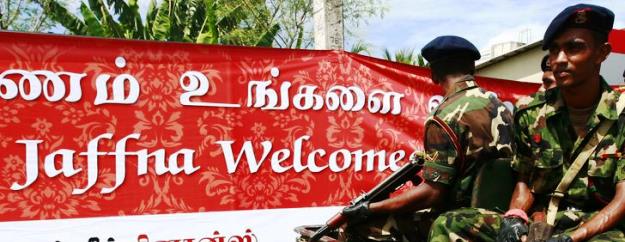Chief Minister of Sri Lanka’s Northern Province, C.V. Wigneswaran has expressed his dissatisfaction over the domestic investigation mechanism into the war crimes and emphasised that there should be an international dimension in the investigation process as the domestic mechanism would not bring about the expected results.
Wigneswaran, who was answering the questions of journalists during an international tele-press conference on Thursday night and discussing the findings of “The Long Shadow of War” that was published by the Oakland Institute, stated that he doubts if the army would ever leave the lands due to the business aspect.
Highlighting on the number of soldiers who are stationed in the Northern Province, Wigneswarn said that though there had been a general call urging soldiers to get back to the barracks, there were “no exodus of soldiers from the northern province which is perceivable by anyone.”
“Though they are talking in terms of reduction of army, what really happens is, some camps are closed, and they are moved into larger camps e. I don’t think there has been any significance reduction with the number of soldiers in the North” He said.
The Recording of the press call is available at http://www.oaklandinstitute.org/sri-lanka-press-conference-audio
Excerpts of the answers of Wigneswaran:
As far as we are concerned there are certain minimal things which we wanted. For example, with regard to the land that has been released, first they said it was about 1000 Acres, but only around hundred Acres was released. The lands that were given back were not fertile and they were not really useful to the people.
As far as the Tamils are concerned, there has been no political will to help Tamils except when they are forced to do something. This has been one of the characteristics of what has been taking place. The central government in Sri Lanka will not do anything towards the minorities or towards the Tamils, unless they are forced to do something. So, the fact that the matters are being brought up into the open by the Oakland institute is definitely useful in order to bring about the international pressure that is necessary with regard to the government of this sort.
With regard to the domestic investigation, right at the start there were a lot of shortcomings. We are not certain that the domestic investigation would bring about desired results; because number of things that have proceeded should be taken into account. There had been international experts who were brought in to investigate earlier, found, conflict of interest, of the State and of those who were accused of the offenses.
Right from the beginning we have had number of cases, where there had not been any proper investigation. Therefore, the domestic inquiry will not bring about the necessary expected results. I agree there should be an international dimension in the investigation process. I don’t think we can expect anything out of domestic investigative process with no international dimension at all.
Release of lands in the high security zones are completely in the hands of the army. Most of the lands you will see that the original holders of the houses cannot see their houses as they had been completely demolished. The manner in which things are taking place is that the army is not returning the lands to the owners. Even the lands that had been released are not fertile lands, but the good fertile lands are still being cultivated by the army.
I have my doubts that the Army would ever leave those areas, with regard to the business aspect of it and they are doing so much of business activities. Complete control in the economic activities in those areas. They are bringing in Sinhala people from outside to do illegal fishing, and the people of those areas are being prevented by army or navy from fishing.
The information that we received was that the government wanted to handover thousands of acres of land, but only around two hundred acres were given out, because the army simply refused to give back the land to their owners. It was only through various processes that they were able to increase the land release from around two hundred to around thousand.
In fact we were expecting 5,500 acres to be returned out of 6,500 acres. Army having got used to all the benefits of being there do not like to leave the lands. Unless there is some pressure put on by the international community, there is going to be difficulties in releasing anything.
With regard to the number of soldiers, there had been a general call on the army to get back to their barracks. Therefore, there is no ostensible presence of the army, except during the recent incident. There had been no exodus of soldiers from the Northern Province that had been witnessed by people.
Though they are talking in terms of reduction of the army, what really happens is some camps are closed, and the army is moved into larger camps and they are left there. I don’t think there has been any significance reduction in the number of soldiers in the North.
Just two days after the 8th of January, I had an opportunity to meet the Prime Minister, and he made a definite statement that he was going to inform the Buddhist priests that no army camp in the northern province was going to be taken away from there. There after it was stated by Defense Minister Ruwan Wijeyaewardane.
Therefore, it is very clear that there is no intention on the part of the government to remove the army. Sometimes, various statements are made, so we had been always look out to see whether there had been any mass exodus of soldiers from the North, but we found none. Definitely few camps are closed, all the soldiers are taken over into the larger camps, and they are still continuing to be there. The chances are that over 150,000 soldiers are still in the Northern Province.
